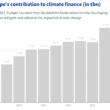The EU Council has officially adopted an updated regulation for European environmental economic accounts, enhancing the EU’s system for merging economic and environmental data. This amendment expands the accounts to include new modules focused on forest ecosystems, ecosystem services, and environmental subsidies.
These updates aim to improve data tracking for the European Green Deal, allowing more accurate monitoring and evaluation of the EU’s progress toward environmental goals. The previous regulation covered six core areas, such as air emissions and environmental taxes, while the newly introduced modules offer deeper insights. The new modules cover – ecosystem accounts to track the extent, condition, and economic and social contributions of ecosystems; forest accounts to measure forest areas, timber availability, and track temporal changes in forest resources, and; environmental subsidies accounts to quantify resources directed toward Green Deal goals, highlighting support for environmental protection and natural resource conservation.
Starting in 2025 and 2026, EU member states will submit data to Eurostat, the EU’s statistical office, to populate these new modules.
The regulation also establishes a statistical data portal operated by Eurostat, set to launch in December 2024. This portal will consolidate key indicators on environmental economic accounts and member state investments in climate change mitigation. Accessible to the public on the Eurostat website, it will update annually.
Following this formal adoption, the regulation will be published in the Official Journal of the European Union and take effect 20 days post-publication. By December 31, 2024, and every two years thereafter, Eurostat will release data on climate mitigation efforts and related investments.
Within two years, the Commission will report on data quality for energy subsidies, climate adaptation, and water issues, potentially recommending additional modules to enhance the accounts.
The previous regulation included six core modules: air emissions, environmental taxes by economic activity, material flow, environmental protection expenditure, environmental goods and services, and physical energy flow accounts. The new modules follow a proposal from July 2022 by the European Commission, with the final regulation agreed upon in December 2023 after Council and European Parliament negotiations.






















